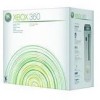Xbox XBOX360 Setup Guide - Page 17
REGULATIONS, For Customers in the United States, Exposure to radio frequency radiation, Disposal - information
 |
UPC - 882224035811
View all Xbox XBOX360 manuals
Add to My Manuals
Save this manual to your list of manuals |
Page 17 highlights
reGuLationS For Customers in the United States This equipment has been tested and found to comply with the limits for a Class B digital device, pursuant to Part 15 of the FCC rules. These limits are designed to provide reasonable protection against harmful interference in a residential installation. This equipment generates, uses, and can radiate radio frequency energy. If not installed and used in strict accordance with the instructions given in the printed documentation and/or onscreen help files, the device may cause harmful interference with other radio-communications devices (AM/FM radios, televisions, baby monitors, cordless phones, etc.). There is, however, no guarantee that RF interference will not occur in a particular installation. To determine if your hardware device is causing interference to other radio-communications devices, disconnect the device from your computer or remove the device's batteries (for a battery operated device). If the interference stops, it was probably caused by the device. If the interference continues after you disconnect the hardware device or remove the batteries, turn the device off and then on again. If the interference stopped when the device was off, check to see if one of the input/output (I/O) devices is causing the problem. Disconnect the I/O devices one at a time and see if the interference stops. If this hardware device does cause interference, try the following measures to correct it: • Relocate the antenna of the other radiocommunications device (AM/FM radio, television, baby monitor, cordless phone, etc.) until the interference stops. • Move the hardware device farther away from the radio or TV, or move it to one side or the other of the radio or TV. • Plug the device into a different power outlet so that the device and radio or TV are on different circuits controlled by different circuit breakers or fuses. • If necessary, consult the dealer or an experienced radio/TV technician for more suggestions. Caution Any changes or modifications made on the system not expressly approved by the manufacturer could void the user's authority to operate the equipment. Caution Exposure to radio frequency radiation To comply with FCC RF exposure requirements, the following operating configurations must be satisfied: The antenna has been installed by the manufacturer and no changes can be made. The wireless devices must not be co-located or operating in conjunction with any other antenna or transmitter. Except for headset and handheld devices, wireless devices must be at least 20 cm between the antenna of the wireless device and all persons. FCC Declaration of Conformity (DoC): Trade Name: Microsoft Corp. Models: 1438, 1439 Responsible Party: Microsoft Corporation Address: One Microsoft Way, Redmond, WA 98052 U.S.A. Telephone No.: (800) 4MY-XBOX This device complies with Part 15 of the FCC Rules. Operation is subject to the following two conditions: (1) this device may not cause harmful interference, and (2) this device must accept any interference received, including interference that may cause undesired operation. This product is for use with NRTL-listed (UL, CSA, ETL, etc.) and/or IEC/EN 60950 compliant (CE marked) Information Technology equipment. Disposal of Waste Batteries and Electrical & Electronic Equipment This symbol on the product or its batteries or its packaging means that this product and any batteries it contains must not be disposed of with your household waste. Instead, it is your responsibility to hand this over to an applicable collection point for the recycling of batteries and electrical and electronic equipment. This separate collection and recycling will help to conserve natural resources and prevent potential negative consequences for human health and the environment due to the possible presence of hazardous substances in batteries and electrical and electronic equipment, which could be caused by inappropriate disposal. For more information about where to drop off your batteries and electrical and electronic waste, please contact your local city/municipality office, your household waste disposal service, or the shop where you purchased this product. 15











